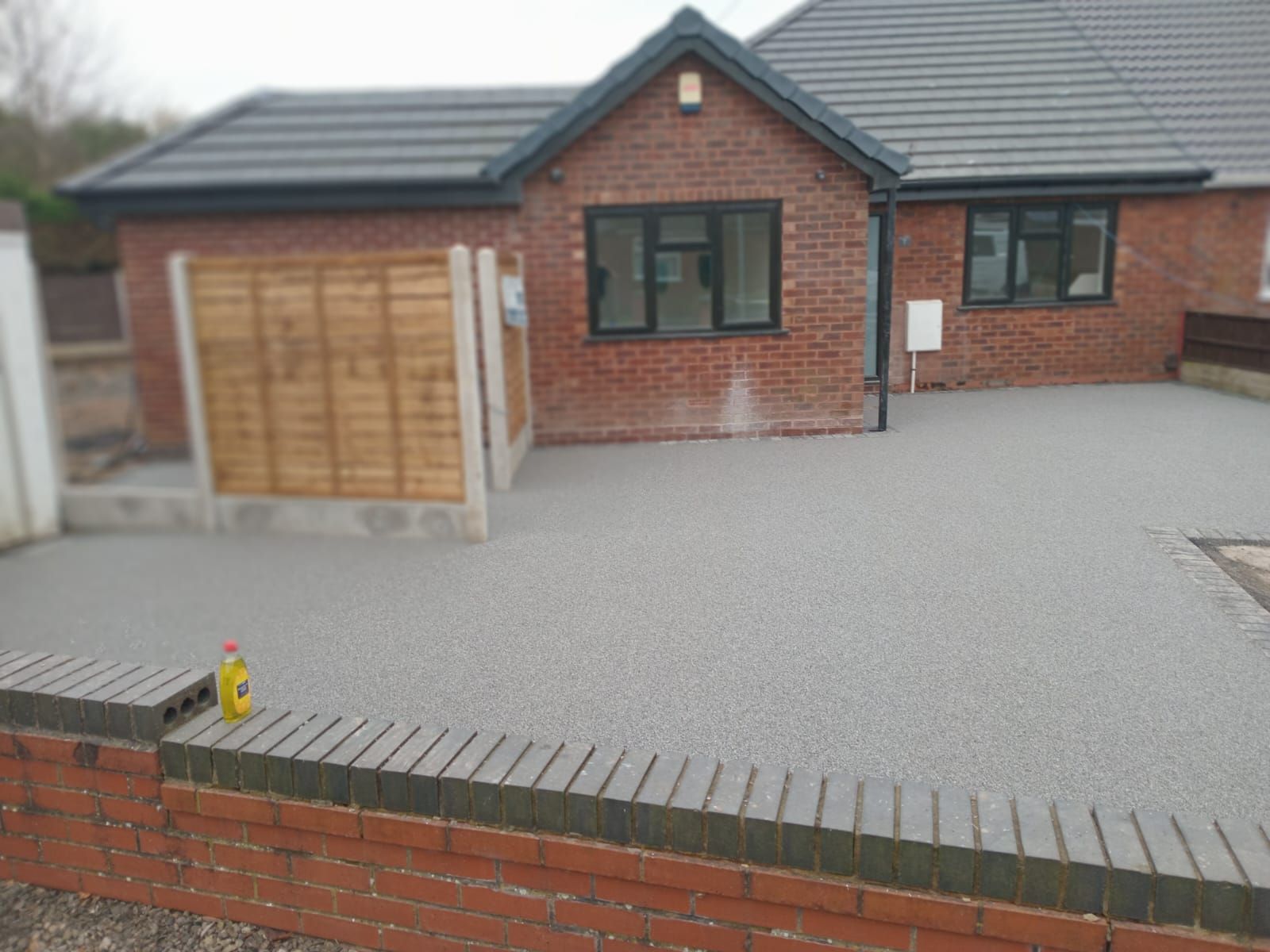DIY Resin Bound Driveways
A Complete Guide to Installing Your Own Resin Bound Driveway in Essex
Resin driveways have become an increasingly popular option for homeowners looking to add a sleek, durable, and modern finish to their homes. Offering excellent durability, low maintenance, and aesthetic appeal, resin-bound driveways provide a perfect balance between function and design. And the best part? You can install one yourself with the right tools, materials, and a bit of know-how.
In this comprehensive guide, we’ll cover everything you need to know about DIY resin driveways, from the benefits to the installation process and tips for long-term maintenance. Whether you're looking for a cost-effective way to enhance your property or want to tackle a rewarding home improvement project, this guide will help you get started.
Why Choose a Resin Bound Driveway?
Before diving into the DIY process, let’s explore why so many homeowners are choosing resin-bound driveways over traditional materials like asphalt or concrete. These driveways are made by mixing natural aggregates (such as stone or gravel) with a clear, UV-stable resin that binds the materials together, creating a smooth, permeable surface. This type of driveway offers several advantages:
Durability and Strength
Resin-bound surfaces are incredibly tough and can withstand heavy traffic without cracking or wearing down. Whether you’re parking a car or have a driveway that sees a lot of foot traffic, resin can handle it. The materials are flexible, which allows them to resist cracking even in extreme weather conditions.
Permeability
One of the standout features of resin-bound driveways is their permeability. The porous surface allows rainwater to drain through the driveway, reducing the risk of flooding and eliminating puddles. This makes resin-bound driveways environmentally friendly, as they help manage surface water more sustainably.
Low Maintenance
Unlike block paving or gravel driveways, resin-bound surfaces require minimal maintenance. You won’t need to worry about weeds growing through the surface, and keeping it clean typically involves nothing more than a quick sweep or rinse.
Aesthetic Appeal
Resin-bound driveways offer endless design possibilities. You may choose from a variety of natural aggregates in different colours, allowing you to create a completely customised look that complements your home’s exterior. The smooth finish also provides a polished, high-end appearance.
Cost-Effective
One main advantage of opting for a DIY resin driveway is the cost savings. Hiring professionals to install a resin driveway can be expensive, but by doing it yourself, you can save a significant amount of money while still achieving a professional-looking finish.
What You Need for a DIY Resin Driveway
Installing your own resin driveway is entirely possible with the right materials and tools. However, it’s crucial to prepare properly to ensure the installation goes smoothly. Here’s a list of the basic supplies you’ll need to get started:
Materials:
- Resin: Make sure to use a high-quality, UV-stable resin designed for outdoor use. This prevents the driveway from yellowing or degrading under sunlight.
- Aggregates: Choose natural stones, gravel, or recycled glass aggregates in the color and texture of your choice.
- Primer: A suitable primer to apply to the base layer before laying the resin and aggregates.
- Weed membrane: Helps prevent any weeds from growing through the driveway.
- Sand: Provides additional texture to improve the grip on your driveway.
Tools:
- Forced action mixer: This is crucial for thoroughly mixing the resin and aggregates to ensure even coverage.
- Trowels: Used to spread the mixture evenly across the surface.
- Spiked roller: Helps release air bubbles and ensure a smooth finish.
- Brushes: For applying the primer and for cleaning during the preparation phase.
- Protective gear: Gloves, goggles, and a mask to protect yourself while working with resin and aggregates.
How to Install a DIY Resin Driveway: Step-by-Step Guide
Now that you have the necessary tools and materials, it’s time to start installing your DIY resin bound driveway or patio. Below is a step-by-step guide that will walk you through the process.
Step 1: Prepare the Surface
The first step in installing a resin bound driveway is ensuring that the surface is properly prepared. The existing driveway or patio surface must be clean, dry, and stable. Typically, resin-bound driveways are installed over solid surfaces like concrete or asphalt. However, they can also be installed over compacted hardcore.
- Remove debris: Clear the area of any weeds, dirt, and debris.
- Repair cracks: If you’re laying resin over an existing surface like concrete, make sure to repair any cracks or potholes to create a stable base.
- Apply weed membrane: This step helps prevent any future weed growth from compromising your driveway.
Step 2: Apply the Primer
Once the surface is ready, apply a primer to the base layer. This will ensure that the resin and aggregate mixture adheres appropriately to the surface. Use a brush or roller to apply the primer evenly across the entire surface. Allow it to dry completely before moving on to the next step.
Step 3: Mix the Resin and Aggregates
Next, it’s time to mix the resin and aggregates. Using a forced action mixer, combine the aggregates and resin according to the manufacturer’s instructions. The resin must be mixed thoroughly to ensure even distribution, which is why using the correct mixer is critical.
- Be mindful of the working time: Resin can harden quickly, so it’s essential to work efficiently and only mix what you can lay in a short period.
Step 4: Spread the Mixture
Once the resin and aggregate are mixed, pour the mixture onto the prepared surface. Use a trowel to spread it evenly across the driveway, ensuring that the layer is around 15-18mm thick. Be sure to work quickly to avoid the resin setting before the surface is completely covered.
Step 5: Smooth the Surface
After spreading the mixture, use a spiked roller to remove any air bubbles and ensure a smooth, even finish. The spiked roller also helps to compact the surface, making it more durable in the long run.
Step 6: Let It Cure
The final step is to allow your newly installed resin driveway to cure. The curing process usually takes 24-48 hours, depending on weather conditions. During this time, it’s important to keep the area free from foot traffic and vehicles. After it has fully cured, your driveway will be ready for use.
Tips for Maintaining Your Resin-Bound Driveway
One of the major advantages of resin driveways is that they require minimal maintenance. However, following a few simple maintenance tips can help extend the lifespan of your driveway and keep it looking pristine:
- Regular cleaning: Keep the surface clear of leaves, dirt, and other debris by sweeping regularly or hosing it down.
- Avoid heavy impacts: While resin driveways are durable, sharp objects or heavy impacts can damage the surface, so be mindful of the types of activities you perform on your driveway.
- Prevent staining: Clean up oil or chemical spills immediately to prevent stains from setting into the surface.
- Reseal if needed: Over time, the resin may lose its luster. If this happens, you can reseal the surface to restore its original shine.
Conclusion: DIY Resin Driveways for the Modern Homeowner
Installing a DIY resin driveway is a fantastic way to upgrade the appearance of your home while also adding durability and functionality. With its cost-effectiveness, environmental benefits, and ease of maintenance, a resin-bound driveway is a perfect choice for modern homeowners looking for a stylish and practical solution.
By following this guide and taking the time to plan and prepare properly, you can achieve a professional-quality finish without the cost of hiring contractors. Whether you're improving your curb appeal or adding value to your property, a DIY resin driveway is a rewarding and worthwhile project.
Please also be mindful of the following advice from experts:
There are no specific statistics provided on the success or failure rates of DIY resin driveway installations. However, the sources strongly caution against DIY installation and highlight several risks:
- The complexity of installation: Resin driveway installation is described as a complex job with numerous possibilities for errors, especially for inexperienced DIYers.
- Specialised equipment needed: Proper installation requires specialised tools like forced action mixers, which most homeowners don't have access to.
- Time-sensitive process: The resin mixture sets quickly, requiring efficient and experienced application to avoid issues.
- Weather sensitivity: Installation is highly dependent on proper weather conditions, which can be difficult for DIYers to assess and manage correctly.
Potential for costly mistakes: Errors in DIY installation can lead to problems that are expensive and difficult to rectify, such as:
Inconsistent color fading and patching
- Reflective cracking
- Weak bonding causing crumbling
- Surface shading
- Loose aggregate
Professional expertise required: The sources emphasise that resin driveway installation typically requires a team of at least three highly trained professionals.
While specific success/failure statistics aren't provided, the overall message from industry experts is that DIY resin driveway installations carry a high risk of problems and are not recommended. Professional installation is strongly advised to ensure proper results and longevity of the driveway.
Are you ready to start your own DIY resin driveway project? With the right materials, tools, and preparation, you'll be well on your way to creating a beautiful and long-lasting driveway for your home.
For further information, Click here to visit our website or call Essex Resin Driveways on 01245-968085.
Click here to complete our contact form and see how we can help you with your Driveway requirements.
You might also like
Book a Service Today
We will get back to you as soon as possible
Please try again later
Location
Call
All Rights Reserved | Essex Resin Driveway | Powered by Snapps


